| |
CE |
Day |
Event |
Vikram
Samvat |
Month |
Tithi |
| |
|
||
19 November || |
|
|
|
| 1996 |
Tuesday |
Murti-pratishtha at Khakharda |
2053 |
Kãrtik |
sud 9 |
| |
|
|
|
|
|
| |
|
|
|
|
|
| |
|
||
20 November || |
|
|
|
| 1820 |
Monday |
Kariyani-12
Describing the power of spiritual discourses, Shriji Maharaj says,
"Regardless of how lustful, angry, greedy or lewd a person may
be, if he listens to these types of discourses with faith and love,
all of his flaws would be eradicated. For example, if a man with teeth
strong enough to chew raw chana were to eat a great many sour mangoes,
then he would not be able to chew even boiled rice. In the same way,
if a person who is strongly overpowered by lust, anger, etc., were
to listen to these discourses with faith and persistence, then that
person would no longer be capable of indulging in the panchvishays."
|
1877 |
Kãrtik |
sud 15 |
| 2001 |
Tuesday |
Murti-pratishtha
at Vankal |
2058 |
Kãrtik |
sud 5 |
| |
|
|
|
|
|
| |
|
|
|
|
|
| |
|
||
21 November || |
|
|
|
| 1819 |
Sunday |
Vachanamrut Gadhada I-1
This is the very first Vachanamrut. Shriji Maharaj asks the first
question, "Which is the most difficult of all spiritual endeavours?"
He himself gave the answer, "There is no spiritual endeavour
more difficult than to continuously engage one’s mind on the
form of God. The scriptures state that there is no greater attainment
for a person whose mind’s vrutti is constantly focused on the
form of God, because the form of God is like a chintamani. Just as
a person who possesses a chintamani attains whatever he desires, a
person whose mind’s vrutti is constantly focused on the form
of God can instantly see, if he so wishes, the forms of jiva, ishwar,
maya and Brahma. He can also see Vaikunth, Golok, Brahmamahol and
the other abodes of God. Therefore, there is no spiritual endeavour
more difficult nor is there any greater attainment than to continuously
engage one’s mind on the form of God." |
1876 |
Mãgshar |
sud 4 |
| 1825 |
Monday |
Vachanamrut Vartal-1
Shriji Maharaj says, "Regarding one who takes up a fight with
his mind – if he wins, then he attains nirvikalp samadhi
and becomes an ekantik bhakta of God. But if he should lose to his
mind, he falls from his spiritual endeavours. Then, maybe after one
life or two lives or even after many lives, ultimately, he will become
an ekantik bhakta; but his efforts will not have been in vain.
“Thus, a person who is wise should definitely develop enmity
towards his mind for the sake of his liberation. Thereby, if he conquers
his mind, he is sure to benefit; but even if he is defeated by his
mind, he will eventually return to the path of realisation, which
is also beneficial in the end. Therefore, one who aspires for liberation
should most certainly develop enmity towards his mind.” |
1882 |
Kãrtik |
sud 11 |
| 1828 |
Friday |
Vachanamrut Gadhada III-27
Describing the bliss experienced by associating with God, Shriji Maharaj
says, "The pleasures associated with sights, sounds, smells,
tastes and touch are all found to co-exist in one place – the
blissful and divine form of Purushottam Bhagwan. When we have the
darshan of that form of God, we can enjoy the bliss of that beauty,
as well as the bliss of the other four types of vishays, i.e., sounds,
touch, etc. That gratification occurs simultaneously. With worldly
vishays, however, when one indulges in one vishay, one receives the
gratification of only that vishay, but not of the others. Thus the
pleasures of worldly vishays are found separately. Moreover, those
pleasures are futile, perishable and ultimately the cause of extreme
misery. But in God, one enjoys the bliss of all of the vishays simultaneously.
That bliss is extremely divine; it is eternal and imperishable. Therefore,
a spiritual aspirant should develop vairagya towards the worldly vishays
and become totally attached to the divine and blissful form of God.” |
1885 |
Kãrtik |
sud 15 |
| 1854 |
Tuesday |
Pramanand Swami passes away to Akshardham
|
1911 |
Mãgshar |
sud 8 |
| 1999 |
Sunday |
Murti-pratishtha at Vaso (Women's Mandir) |
2056 |
Kãrtik |
sud 13 |
| 2004 |
Sunday |
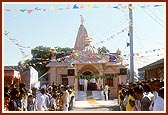 Murti-pratishtha
at Khambhda Murti-pratishtha
at Khambhda
|
2061 |
Kãrtik |
sud 10 |
| |
|
|
|
|
|
| |
|
|
|
|
|
| |
|
||
22 November || |
|
|
|
| 1819 |
Monday |
Vachanamrut Gadhada I-2
Describing the characteristics of a person with the highest level
of detachment, Shriji Maharaj says, "A person who has the highest
level of vairagya engages in worldly activities, either by God’s
command or as a consequence of his prarabdha karmas. But, like King
Janak, he is not affected by those activities. He may indulge in the
most alluring of the panchvishays – sights, sounds, smells,
tastes and touch – attained as a consequence of his own prarabdha,
but he does so dejectedly and with total indifference towards them.
Those vishays are unable to entice him; thus, his renunciation remains
undiminished. He invariably views those vishays as flawed and treats
them like enemies. Moreover, he constantly remains in contact with
sadhus and the sacred scriptures, and remains in the service of God.
Even if he were to encounter adverse places, times, company, etc.,
his understanding would not diminish. Such a person is said to possess
the highest level of vairagya." |
1876 |
Mãgshar |
sud 5 |
| 1824 |
Monday |
Vachanamrut Gadhada II-62
Revelaing His inner thoughts, Shriji Maharaj says, "There are
three inclinations which lead to liberation and which lead to extreme
bliss. Of these, one is profound atma-realisation, which is to believe
one’s true self to be the atma and engage in the worship of
God, like Shukji. The second is like the inclination of a woman who
observes the vow of fidelity, which is to worship God as if He is
one’s husband, just as the gopis did. The third is the inclination
of servitude, which is to worship God as His servant, just like Hanumanji
and Uddhavji. Without these three inclinations, there is no way in
which the jiva can attain liberation. |
1881 |
Mãgshar |
sud 2 |
| 1828 |
Saturday |
Vachanamrut Gadhada III-28
Elaborating upon the understanding of a devotee of God, Shriji Maharaj
states, “One who has understood the greatness of God realises
that only God is all-blissful, whereas the pleasures derived from
the panchvishays have only a slight fraction of the bliss of God;
thus he would never become attached to any object. The Moksh-dharma
also mentions: ‘Compared to the bliss of the abode of God, the
pleasures of the other realms are like narak.’ This is the understanding
that a devotee of God should have." |
1885 |
Kãrtik |
vad1 |
| 1884 |
|
Vach Gadhada I-8
Shriji Maharaj guides, "One should indulge in the vishays only
as prescribed in the scriptures; but one should never indulge in them
by transgressing the regulations that are described in the scriptures.
Also, one should keep association with the Sant and should shun bad
company. In this manner, when a person shuns bad company and maintains
association with the Sant, the sense of I-ness that he harbours towards
his body and the sense of my-ness that he harbours towards his bodily
relations are eradicated. He also develops profound love for God and
vairagya towards everything except God.” |
1881 |
Mãgshar |
sud 2 |
| 1939 |
Wednesday |
Shantilal
(later Pramukh Swami Maharaj) initiated into parshad-fold
|
1996 |
Kãrtik |
sud 11 |
| 1990 |
Thursday |
Murti-pratishtha at Pati (Women's Mandir) |
2047 |
Mãgshar |
sud 5 |
| 2000 |
Wednesday |
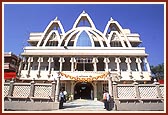 Murti-pratishtha
at Navi Mumbai (Nerul) Murti-pratishtha
at Navi Mumbai (Nerul)
|
2057 |
Kãrtik |
vad 12 |
| |
|
|
|
|
|
| |
|
|
|
|
|
| |
|
||
23 November || |
|
|
|
| 1819 |
Tuesday |
Vachanamrut Gadhada I-3
Blessing the assembly of sadhus and devotees, Shriji Maharaj says,
"Even one who can constantly see the form of God in his heart
should recall the divine actions and incidents of God performed in
His various avatars in various places. He should also maintain affection
for the brahmacharis, sadhus and satsangis, and should remember them
as well. Why? Because if at the time of death he forgets God’s
form, but remembers the divine actions and incidents performed by
Him at various places, or if he remembers those satsangis, brahmacharis
or sadhus, then by that association, God’s form will also be
remembered. Thereby, that person attains an elevated spiritual status
and benefits tremendously. That is why I perform grand Vishnu-yags;
annually celebrate Janmashtami, Ekadashi and other observances; and
gather brahmacharis, sadhus and satsangis on these occasions. After
all, even if a sinner remembers these occasions at the time of his
death, he will also attain the abode of God.” |
1876 |
Mãgshar |
sud 6 |
| 1824 |
Monday |
Khushal Bhatt initiated into sadhufold,
named Gopalanand Swami
|
1886 |
Kãrtik |
vad 8 |
| 1825 |
Wednesday |
Vachanamrut Vartal-2
Shriji Maharaj explains how to please God, "If we do not malign
God, then God becomes pleased. Then you may ask, ‘What does
it mean to malign God?’ Well, God is the all-doer of this world.
However, if one does not understand Him to be the all-doer and instead
believes that it is kal that is the all-doer of this world, or that
it is maya, or that it is karma, or that it is swabhav that is the
all-doer, then one is maligning God. This is because actually God
is the all-doer. To ignore this and to claim that only kal, karma,
maya and swabhav are the all-doers of this world is serious slander
against God. " |
1882 |
Kãrtik |
sud 13 |
| 2002 |
Saturday |
Murti-pratishtha
at Bopal
|
2059 |
Kãrtik |
vad 3 |
| |
|
|
|
|
|
| |
|
|
|
|
|
| |
|
||
24 November || |
|
|
|
| 1819 |
Wednesday |
Vachanamrut Gadhada I-4
Shriji Maharaj emphasizes, "Devotees of God should not harbour
jealousy amongst themselves."
However, Shriji Maharaj allows, "If one is to harbour jealousy,
one should imbibe the virtues of the person towards whom one is jealous,
and should also abandon one’s own faults. If this cannot be
done, then a devotee of God should at least totally abandon any form
of jealousy that would result in harming another devotee of God.”
|
1876 |
Mãgshar |
sud 7 |
| 1983 |
Thursday |
Murti-pratishtha at Palana
|
2040 |
Kãrtik |
vad 4 |
| 1990 |
Saturday |
Murti-pratishtha at Botad |
2047 |
Mãgshar |
sud 7 |
| 2002 |
Sunday |
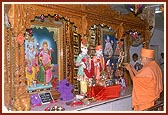 Murti-pratishtha
at Saraspur Murti-pratishtha
at Saraspur |
2059 |
Kãrtik |
vad 4 |
| |
|
|
|
|
|
| |
|
|
|
|
|
| |
|
||
25 November || |
|
|
|
| 1819 |
Thursday |
Vachanamrut Gadhada I-5
Shriji Maharaj says, "One should meditate on Shri Krishna Bhagwan
together with Radhika. If during that meditation one cannot behold
the form within one’s heart, one should not lose faith and stop
the meditation. Those who persist in this way will earn the immense
grace of God. Moreover, God will be bound by their bhakti.”
|
1876 |
Mãgshar |
sud 8 |
| 2001 |
Sunday |
 Murti-pratishtha
at Dholka Murti-pratishtha
at Dholka |
2058 |
Kãrtik |
sud 10 |
| 1819 |
Thursday |
Vachanamrut Gadhada I-6
Shriji Maharaj describes how to attain greatness in Satsang, "In
this Satsang fellowship, a person who is wise increasingly finds flaws
within himself and perceives virtues in God and His devotees. Moreover,
when God and His Sant utter harsh words of advice for his own benefit,
he accepts them as beneficial and is not hurt by them. Such a person
steadily attains greatness in Satsang." |
1876 |
Mãgshar |
sud 8 |
| 1822 |
Monday |
Vachanamrut Gadhada II-27
Justifying the need for mandirs, Shriji Maharaj explains, "A
devotee is required to pick flowers and tulsi for God; he is required
to bring various types of vegetables and to cultivate gardens for
God; he must also build mandirs. Therefore, one who sits idly, maintaining
extreme renunciation and compassion, is unable to offer bhakti to
God. When bhakti diminishes, the upasana of God is also destroyed,
and a lineage of blind followers results. That is why I have had mandirs
built – for the purpose of preserving God’s upasana
forever. "
|
1879 |
Kãrtik |
sud 11 |
| 2002 |
Monday |
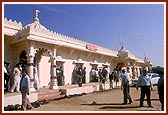 Murti-pratishtha
at Ghatlodiya Murti-pratishtha
at Ghatlodiya |
2059 |
Kãrtik |
vad5 |
| 2002 |
Monday |
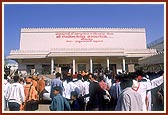 Murti-pratishtha
at Sola Road Murti-pratishtha
at Sola Road |
2059 |
Kãrtik |
vad 5 |
| |
|
|
|
|
|
| |
|
|
|
|
|
| |
|
|
|
|
|
|
|




